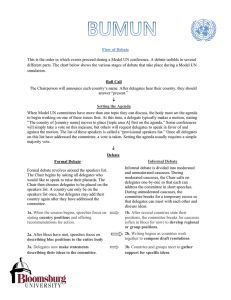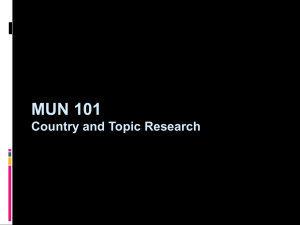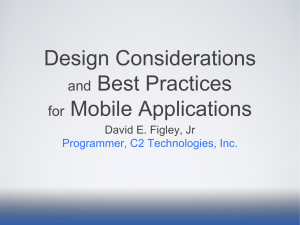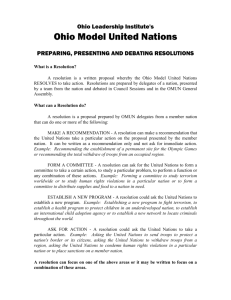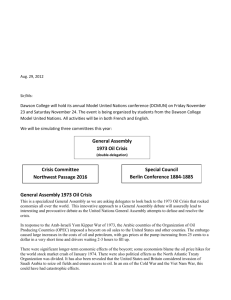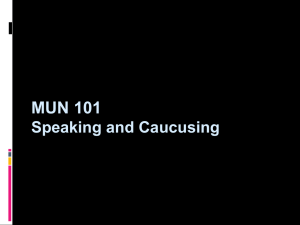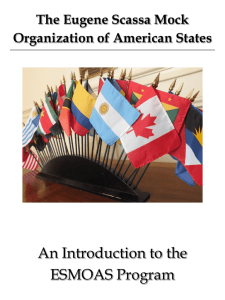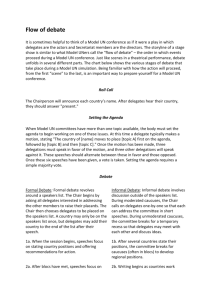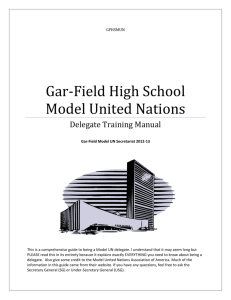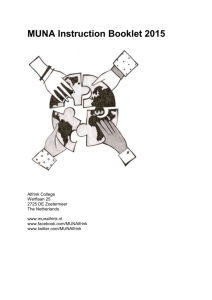Click here to open the Delegate Guide.
advertisement
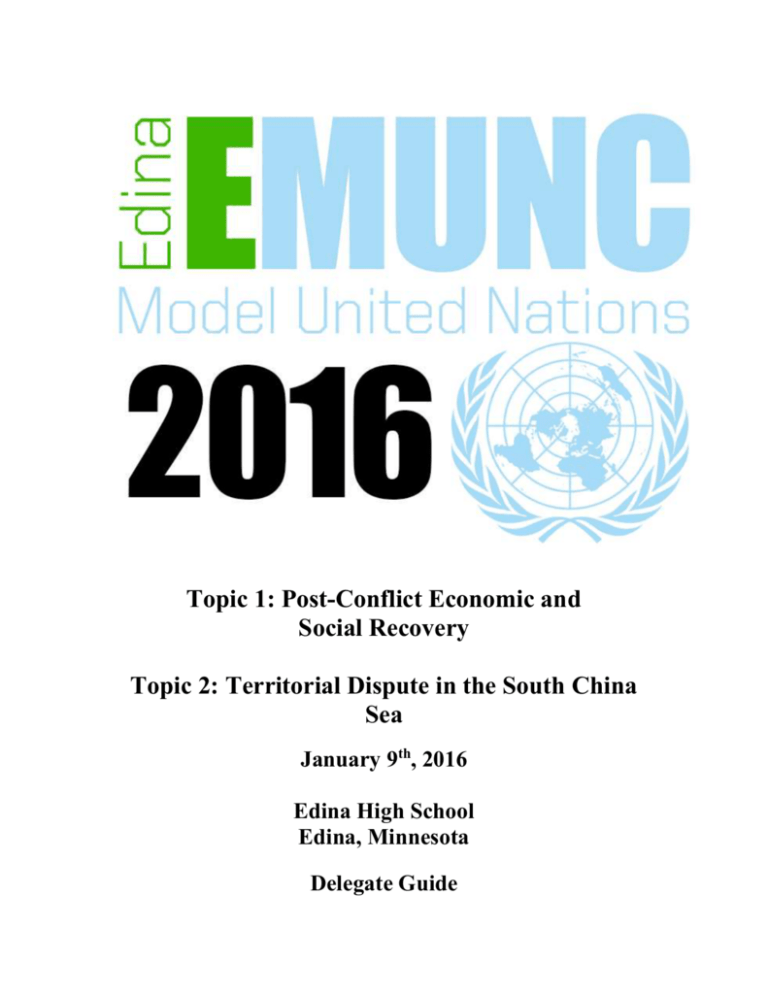
Topic 1: Post-Conflict Economic and Social Recovery Topic 2: Territorial Dispute in the South China Sea January 9th, 2016 Edina High School Edina, Minnesota Delegate Guide To the Student Delegates attending EMUNC 2016: On behalf of the entire staff and student body of Edina High School, welcome to the 2016 Edina Model United Nations Conference. Everyone on the EMUNC staff would like to thank you for your participation. We look forward to working with you and making the 2016 EMUNC a successful experience for all involved and continuing the traditions of Twin Cities-area Model United Nations. The primary goal of EMUNC is to encourage students to recognize the world’s problems and discover innovative ways to solve them through diplomatic relations. We hope that throughout this conference, delegates are exposed to new perspectives concerning the issues of Post-Conflict Economic and Social Recovery as well as the Territorial Dispute in the South China Sea. We are inspired to form a stronger relationship with the schools and communities around them. You have already taken the first step in this process by participating in Model UN and attending this conference. We encourage you to be actively engaged in the debate and committee proceedings as they develop throughout the conference. This delegate guide as well as the conference background guide will be important resources for you as you research and prepare your country’s position on the topic. It is also our hope that in addition to productive discussion, debate, and resolution writing, delegates will enjoy their time and have fun. Once again, we greatly appreciate your participation in the 2015 Edina Model United Nations Conference. Sincerely, The EMUNC Staff Conference Preparation Topic Research: This is the first step in researching for a Model UN conference and consists of developing a firm understanding of the topic at hand including past United Nations actions taken in regards to that topic. The background guide will be a very useful tool regarding this phase of the research. Country Research: You should have a strong understanding of all of the demographic, economic, political and ideological intricacies that make your country’s perspective unique. Be aware of your country’s history, political systems, cultural and economic issues, and relevant current events concerning your country. You should also recognize your country’s traditional allies and adversaries, as well as regional and trans-regional organizations to which your country belongs. Country and Topic Connection: To be effective in committee, connect your knowledge on the topic to your knowledge on your country. This is where you begin to ask questions as to how this particular topic has influenced your country’s government, and examine your country’s responses to this issue in the past. You should be familiar with how the topic has affected the political and socio-economic situation of your country, as well as what steps your country has taken to address the topic previously. Potential Solutions: This is perhaps the most difficult part of preparation for a conference. Remember that the topic is broad, with many potential avenues for solutions. Solutions must be reasonable and effective, represent your country’s realistic position, and be financially feasible. Originality and creativity are encouraged, but collaboration is also essential. All solutions must be within the powers of the committee, and pre-written resolutions are not allowed at EMUNC. Position Papers: You must write a paper in which you clearly and concisely express your country’s position on the topic and offer potential avenues for solutions that your delegation will pursue during the committee session. Position paper guidelines for EMUNC are as follows: Typed, single-spaced, 1-inch margins, 10-12pt font Maximum of 1 page in length Sources cited in MLA format. Works cited do not count toward the 1-page maximum length. Each paper should include a heading that indicates the following: Committee Name Country Name School Name Date of Conference All final position papers should be emailed to papers@emunc.org no later than January 5th, 2016 to be considered for awards. The Conference Parliamentary Procedure: EMUNC will observe the same rules as conferences run by Global Classrooms, MN. Below is a summary of important facets of parliamentary procedure that each delegate should be aware of prior to attending EMUNC. Types of Debate: At the conference, you will encounter a few different formats for discussing or presenting ideas with your fellow delegates. This will include the typical types of debate at most Model U.N. conferences: the Speakers’ List, Moderated Caucuses, and Un-moderated Caucuses. Speakers’ List: This 30 to 45 second prepared speech should be clear in outlining your country’s position on the topic. A speaker’s list speech should be concise and should present your delegation as one that is knowledgeable, engaged and diplomatic. Moderated Caucus: The moderated caucus is the most formal type of debate at a Model United Nations conference, and works similarly to a speaker’s list speech but with some key differences. The chair will designate one delegation at a time to speak, but discussion will be more focused on one issue and will consist of direct discussion between delegations. A moderated caucus will give you the opportunity to raise concerns you have about a given solution or point made by other delegates with regards to the topic. Un-moderated Caucus: This is the most informal form of debate and is where the majority of the writing and bloc forming will occur. Delegates move around the room and discuss possible solutions in an uncontrolled setting with other delegates. Resolutions: All the researching, preparing, writing, speaking, and debating lead to an important outcome: the crafting of resolutions at the conference. Resolutions are the official way of encompassing all of the various solutions that delegates have debated and prioritized as effective ways of addressing the issue. Below are some logistics concerning resolutions: Resolutions must have at least five sponsors and at least 20% of the delegations in the committee involved as either sponsors or signatories. Resolutions must follow the official format with a header identifying sponsors, signatories, and the resolution title; perambulatory clauses outlining reasons why the committee is discussing the topic; and operative clauses, which indicate the details of the resolution and what the resolution calls the committee to do. Absolutely no prewritten resolutions will be allowed at EMUNC 2016. Evidence of prewritten resolutions may result in the removal of a delegation and the disqualification of the school with which the delegation is associated. Dress Code: As with most Model UN Conferences, EMUNC requires delegates to attend in appropriate western business attire. Tennis shoes, jeans, and other casual clothing are not considered appropriate attire. Men should wear a dress shirt, tie, dress pants, and dress shoes, or a suit if possible. Attire for women may include a dress, dress pants, suit, or a skirt with a blouse or nice top.
